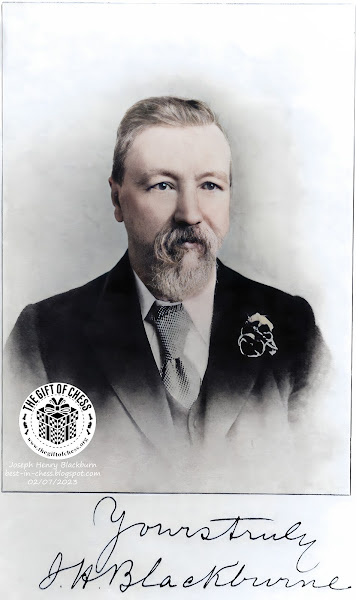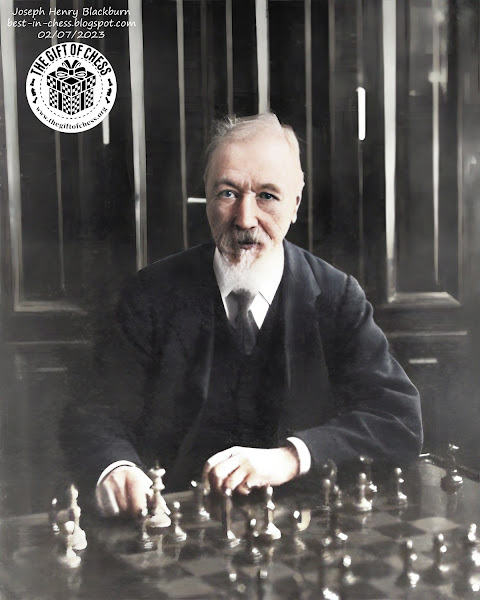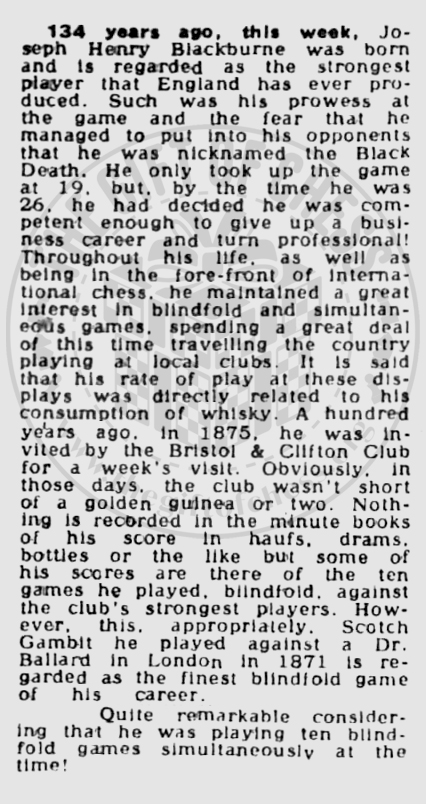Back to Home Index
September 01 1924
Joseph Henry Blackburne, Chess Champion, Grave Marker
September 04 1924
Evening Despatch, Birmingham, West Midlands, England, Thursday, September 04, 1924
A Great Chess Master.
Some Reminiscences of J. H. Blackburne
By One Who Knew Him.
The passing of Joseph Henry Blackburne will be widely regretted, and will be noted as the closing of a historical period in the development of the most ancient mental game known to us.
Born in Manchester in 1841, he began with draughts, was attracted by the marvels of Morphy in the chess world, and especially with Morphy's blindfold play in Birmingham in August, 1858, a report of which he saw in the “Birmingham Gazette,” and having made a short study of chess moves and openings, discovered such surprising genius that in a few months he beat a Russian known as Pindar, who was reckoned the provincial champion of England.
At 20, that is to say 63 years ago, he became champion of the Manchester Club, and in 1862 played 10 concurrent games blindfold, winning five, drawing three, and losing two—a feat far surpassing anything of the kind ever before accomplished by an Englishman.
Birmingham Reminiscences.
For more than 50 years Blackburne came annually to Birmingham, usually playing eight blindfold games, always with great success, though the strongest players of the Birmingham Club were pitted against him, and also giving an evening to concurrent over-the-board play, generally engaging as many opponents as time would allow, invariably winning a large majority, and always arousing admiration by his brilliant surprises.
“How many concurrents would you care to play?” the writer once asked.
“What I would like,” he replied, “would be a few thousand players arranged in eight rows from the Town Hall to the Bull Ring, and to go round them on a bicycle.”
He was full of fun.
As a tourney player against the great masters of all countries Blackburne was less successful than his brilliant genius promised. he was no student, and the analytical, scholarly modern school wore him down.
He was second at Vienna in 1873, tieing with Steinitz, who won in the play-off; and was first at Berlin in 1881, followed by Zukertort, Tchigorin and Winawer; a splendid achievement with three games to spare.
As A Match Player.
As a match player he was moderately successful. Bird, Gunsberg, Golmayo, Vasquez and Lee were beaten; so was Zukertort, a more serious opponent. Three matches with Steinitz, 20 games in all, showed Steinitz 19, Blackburne one, and no draws; while in match with Lasker in 1892. Blackburne in three weeks' play, won no game, though he drew several, such was the result of the meeting of genius alone with the deeply-learned and persistently studious German school.
Blackburne played all over Europe, in America, Africa, and, as he used to say, “in the fifth quarter of the world, Australia.”
Greatest English Exponent.
On our last meeting he spoke of a German aeroplane bomb that exploded over his house, sending a shower of shrapnel down the chimney. He said “It was revenge for the drubbing I gave their champions at Berlin in 1873, when they called me the Black Death.”
Blackburne will be remembered as the great of all English chess players up to the present time. A selection of 400 of his games published in 1899 will continue to delight the chess players the world over as long as chess is played.
September 13 1924
Cheltenham Chronicle and Gloucestershire Graphic, Cheltenham, Gloucestershire, England, Saturday, September 13, 1924
BLACKBURNE.
Joseph Henry Blackburne was born in Manchester on December 10, 1842. He was employed in a Manchester business as a lad, and, interested in the reports of Morphy's performances in England, he bought a second-hand chess handbook for 2d., and from it learnt the rudiments of the game with which his name was destined to be associated for centuries to come. But he never saw Morphy—who by the way, if still living would be but five years older than the age reached by Blackburne. The future British Champion joined the Manchester Chess Club in 1860, and won its championship within a year, apparently in a single match with the previous holder, a player named Pindar. In the following year he again won the championship as the result of a tourney, in which a then famous player, Horwitz—who had lost a match with Morphy—was second. And of course young Blackburne played in matches between Manchester and Liverpool, etc. He took part in the London international tourney of 1862, and though he did not win a prize he won his game with Steinitz—who was soon to be the world champion, remaining so for nearly thirty years. We do not know just when Blackburne became a professional chess player, but think it was in or soon after 1862. In that year he gave an exhibition of “blindfold” chess, ten games simultaneously, winning five, drawing three, losing two. During the fifty years following he played hundreds of blindfold games, and some thousands of ordinary “simultaneous”—a share of them with Cheltenham players. He took part in many international tournaments. and besides minor prizes he won five “firsts.” But he never wrested the world-championship from Steinitz, and was too old to try again after Steinitz lost it to Lasker.
Blackburne had been nearly all over the world, or the European-game part of it. He once, at least, beat Lasker in a tourney game—1899.
Though never “world-champion,” he was a stronger player than Staunton, who was considered world-champion for a few years, through his beating St. Amant, the French champion. In fact Blackburne was the strongest chessplayer, and also the best at “blindfold,” ever produced by the British race or by any part of the British Empire.
Here is one of his finest games, played v. Schwarz (who had Black) in the 1881 international at Berlin.
Joseph Henry Blackburne vs Jacques Schwarz
2nd DSB Congress, Berlin (1881), Berlin GER, rd 16, Sep-16
French Defense: Exchange Variation (C01) 1-0
(a)—B-Q3 is usual now.
(b)—The N on B3.
(c)—Schwartz proposed a draw at this point, but Blackburne, though secure of the first prize, declined.
(d)—If PxB, Black draws by perpetual check.
(e)—This game affords an excellent example of Blackburne's grand power of Chess conception. —Bird, “Modern Chess”
September 14 1924
The Standard Union, Brooklyn, New York, Sunday, September 14, 1924
Joseph Henry Blackburne.
The cable announces the death in London of Joseph Henry Blackburne, greatest native British chess master since the days of Howard Staunton. He was born in Manchester in 1842 and at the age of 20 took first prize in the handicap tournament held in connection with the Second London International Chess Congress in '62, receiving the odds of pawn and move from the big matadors. A few years afterward he beat Steinitz for the City of London Chess Championship; in the Vienna tournament of 1873 he tied for first and second prizes with Steinitz, being beaten in the play-off, and in Berlin in 1881 he carried off first honors.
For the next thirty years he was a regular prize winner in all national or international events he participated in, and he rarely missed a competition. For the last twenty years he devoted himself chiefly to simultaneous and blindfold performances.
From the very outset he displayed remarkable faculties for blindfold playing and it was he who first established a record of sixteen simultaneous games without sight of board or men.
Blackburne was a brilliant player when offered the opportunity. “A little bit of Morphy” was his comment on what others called “a Blackburne gem.” His greatest strength, however, laid in his faultless conduct of end games. All told, he was a most resourceful player, a die-hard.
October 13 1924
The Age, Melbourne, Victoria, Victoria, Australia, Monday, October 13, 1924
Chess.
Death of Blackburne.
The death is announced of Joseph Henry Blackburne, the “Grand Old Man” of British chess, who died on 1st September in his 83rd year. There have been many very strong British chess players, but as a real chess genius Blackburne stood unique. He was essentially a combinative player and viewed with dislike the modern school. He preferred always, to use his own words, “a little bit of Morphy” to the surer methods of the “accumulation of small advantages” of the modern school.
Blackburne's record in international tournaments was very fine. He was first prize winner at Wiesbaden, 1880; Berlin, 1881; Hereford, 1885, and London, 1886. He also carried off the second prize on seven occasions. On the few occasions when he did not figure in the prize list he generally made the best score against the prize winners. The respect the German players had for his prowess is shown by the name they gave him—“der schwarz Tod” (the Black Death).
His skill as a blindfold player was unique. Although his record (16) for the number of blindfold games played at a sitting has been surpassed by later experts, yet it is very doubtful whether the quality of his blindfold play has ever been equalled.
Mr. Blackburne was the first international chess master to visit Australia, which he did over 30 years ago. During his tour he gave exhibitions of simultaneous play, blindfold and otherwise. He had a most successful tour and made himself very popular with the chess public.
A great player and a fine sportsman, his death will be regretted by chess players all over the world.
November 23 1924
The Pittsburgh Post, Pittsburgh, Pennsylvania, Sunday, November 23, 1924
Joseph Henry Blackburne.
Early in September Joseph Henry Blackburne, one of the grandmasters of the past and known as England's “grand old man” of chesa, passed away in his 82d year leaving a vacancy that cannot be filled.
The deceased veteran was a product of the romantic school and as such made the ideal tournament player. The furore over Morphy in England started him on his way and in time he became one of the most dreaded opponents in the international arena. He visited this country in 1889, when he participated in the Sixth American Chess Congress, winning the fourth prize in field of 20 which contested a double-round tournament.
Blackburne is seen at his best in the following game which was won by him in the Ostend tournament:
Dr. Julius Perlis vs Joseph Henry Blackburne
Ostend-B (1907), Ostend BEL, rd 22, Jun-14
Danish Gambit: Declined. Sorensen Defense (C21) 0-1
(a) It would not do to play 7. N-B3, on account of 7.…BxN; 8. NxQ BxQ; 9. NxPch (if 9. KxB, black castles winning a pawn), K-Q; 10. NxR, B-N5, etc.
(b) Black was threatening BxN, followed by QxPch.
(c) This is Blackburne at his best. The move initiates a deep combination, which eventually leads to a win for Black.
(d) Delay in capturing would not improve the outlook for white to any extent, except that he might first deploy his bishop at K3.
(e) Threatening mate in two moves by means of Q-R8ch, followed by N-R7mate.
(f) Not 16. NxR, on account of NxN, leaving white without a loophole for escape at K2.
(g) Holding the N firmly at K5. White is now two pieces ahead, but must surrender one of them at once.
(h) Clearly, he cannot play P-B4, for again checkmate would follow in two moves.
(i) Slightly better would have been K-Q2. After 22. … RxB; 23. NxR, QxN, black would have three pawns in return for the “exchange,” which would likewise win for him.
(j) Evidently white had been under the hallucination that this move might save the piece, but he is promptly shown his mistake.
(k) Neat play, for white cannot play RxP, on account of N-B5ch, etc.
(l) If 32. NxP, RxN; 33. RxR N-B5ch, with a piece to the good.
(m) Right into the jaws of death. He reckons without his host, as will be seen presently.
(n) For if 35. RxR, P-B7; 36. R-B7, N-B3.






































































